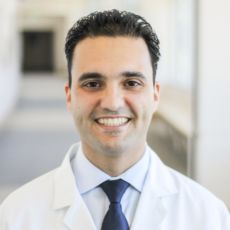SIBO – Small Intestinal Bacterial Overgrowth

Overview
Small Intestine Bacterial Overgrowth Overview
Small intestinal bacterial overgrowth (SIBO) occurs when you have an abnormal increase in the overall bacterial population in the small intestine. The small intestine normally has few bacteria due to the rapid flow of contents and the presence of bile. This bacterial imbalance can cause a variety of uncomfortable symptoms such as bloating, flatulence, diarrhea and/or constipation, and abdominal pain.
There are various risk factors for SIBO and may include:
- Older age
- History of diverticulitis
- Diabetes
- Lupus
- Inflammatory bowel disease
- Crohn’s disease
- Celiac disease
- HIV
- Gastric bypass surgery
- A weakened immune system
- Injury to your small intestine
- Blockages in the GI tract
- Long term chronic use of proton pump inhibitors
- Antibiotics
- NSAID use
- Alcohol use
If you’re experiencing symptoms of SIBO or are concerned about changes to your bowel habits, make an appointment with your Saint John’s Physician Partners gastroenterologist for proper diagnosis and treatment.
Symptoms
Small Intestine Bacterial Overgrowth Symptoms
The symptoms for SIBO are very similar to irritable bowel syndrome (IBS), which is why seeing your doctor for an accurate diagnosis is so important in order to receive appropriate treatment. Having small intestine bacterial overgrowth can have negative effects by making it difficult for your body to absorb fats and carbohydrates from your food and can lead to vitamin deficiencies.
Symptoms of SIBO may include:
- Excess gas and bloating
- Abdominal pain or discomfort
- Diarrhea or constipation
- Queasiness or nausea
- Indigestion
- Fatigue
- Loss of appetite
- Unintended weight loss
Other complications may include:
- Malnutrition
- Anemia
- Dehydration
- Joint pain
- Osteoporosis
- Kidney stones

Diagnosis
Small Intestine Bacterial Overgrowth Diagnosis
Because SIBO causes a wide range of symptoms, it can be difficult to diagnose. Besides your symptoms, medical history and a physical exam, your doctor may order the following to diagnose SIBO:
Small intestine bacterial overgrowth breath testing
SIBO breath testing measures the amount of hydrogen or methane gases exhaled following ingestion of a sugar solution to evaluate for overgrowth of bacteria in the small intestine
Imaging tests
Imaging tests such as X-rays, computed tomography (CT) scan or magnetic resonance imaging (MRI) to look for physical problems in your intestines
Blood tests
Blood tests to check for anemia or lack of vitamins
Stool tests
cannot diagnose Small Intestinal Bacterial Overgrowth (SIBO)
Treatments
Small Intestine Bacterial Overgrowth Treatments
SIBO treatment may include treating underlying medical conditions such as diabetes or celiac disease that can contribute to SIBO. Your doctor will review all your treatment options so you can make an informed decision. Your doctor may also recommend the following:
Antibiotics to stabilize your gut microbiota and reduce the number of intestinal bacteria, typically Xifaxan® or Neomycin. Other less used antibiotics may include Augmentin, Cipro, Flagyl, Noroxin or Bactrim. The type and course of antibiotics will depend on the severity of your condition and underlying condition.
Since you may become dehydrated due to malnutrition, you will need to increase your intake of nutrients and fluids, which you may receive through an IV.
Dietary changes that can help alleviate SIBO, such as limiting carbohydrate and a diet low in fermentable foods such as dairy products, grains and certain fruits and vegetables, commonly referred to as the low-FODMAP diet
Your doctor may refer you to a nutritionist to tailor a diet specific to your diagnosis to help manage your symptoms.
Get regular exercise, which helps regulate your body’s digestive functions.
Specialists





